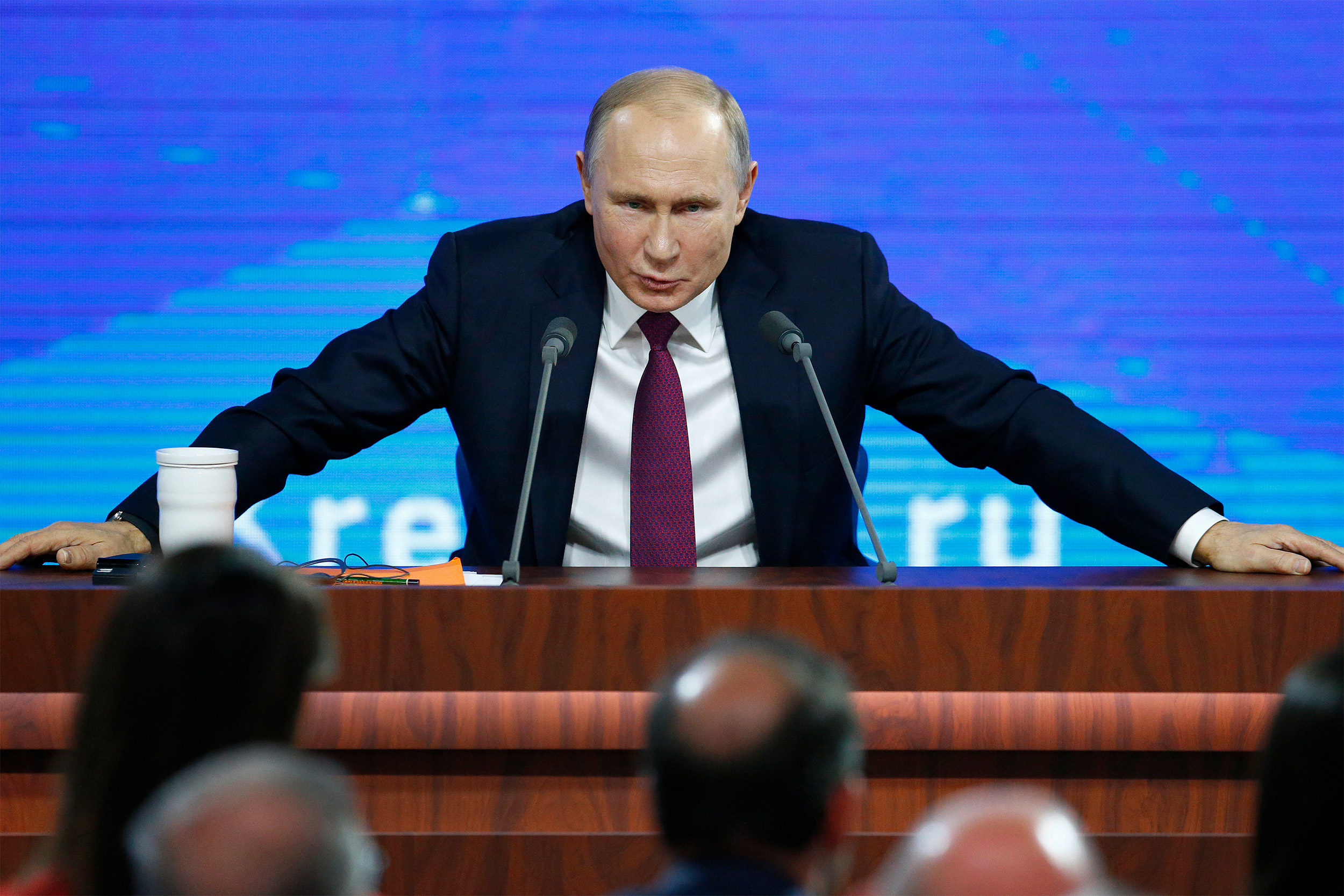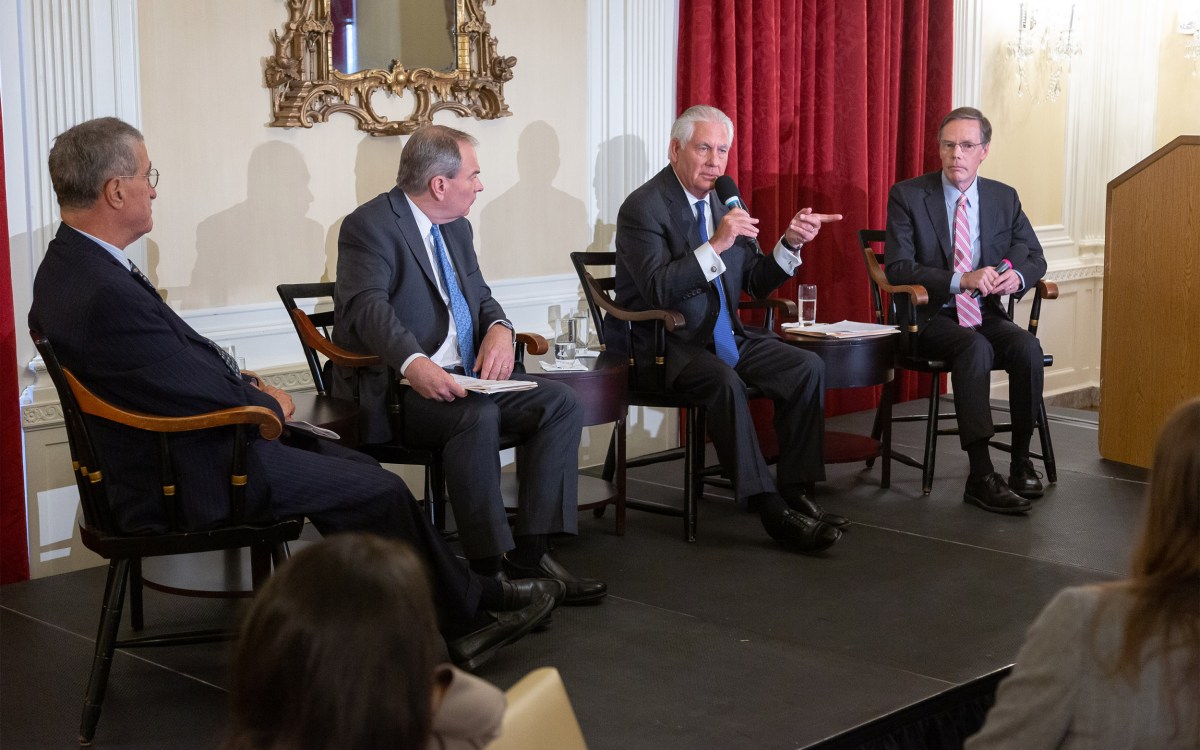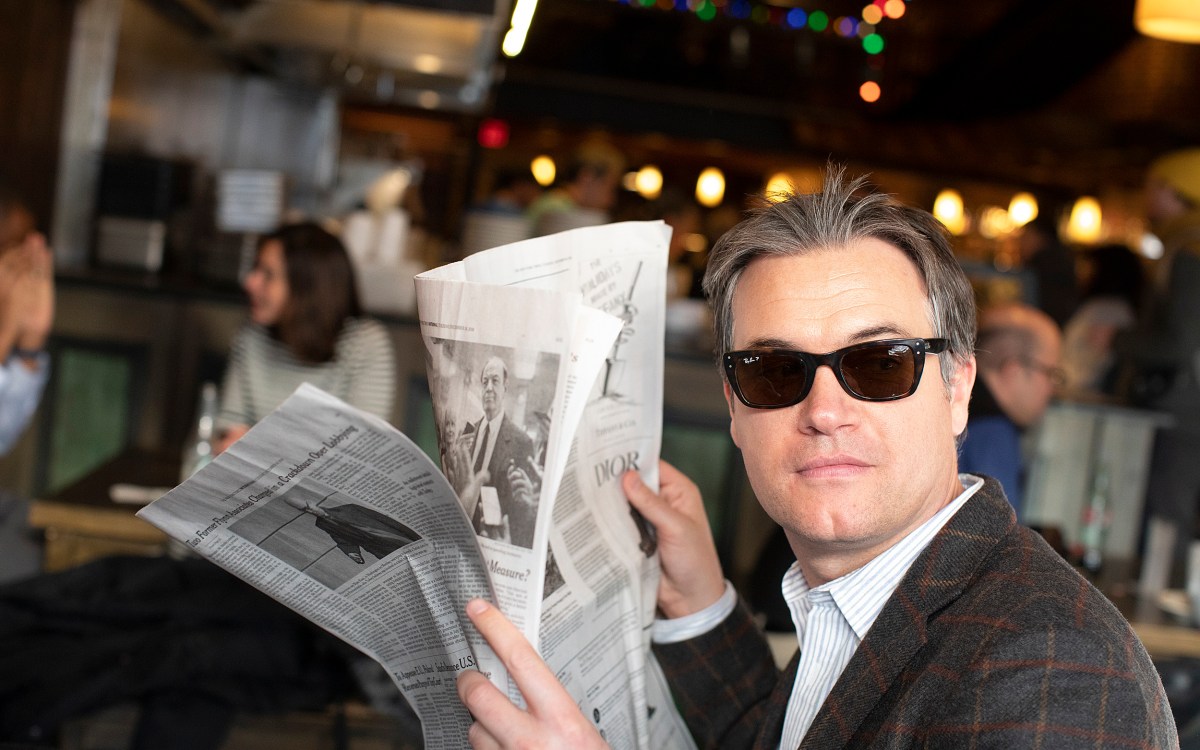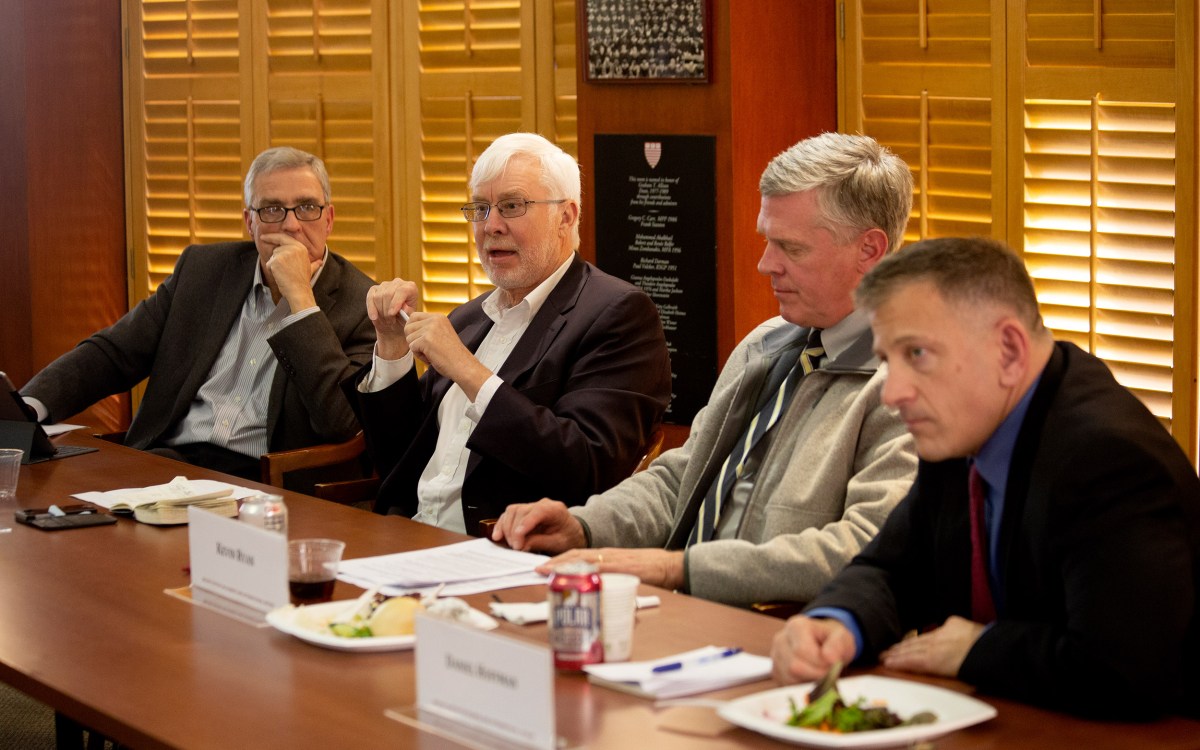
Harvard analysts look back at the unexpected rule of Russian President Vladimir Putin, now 20 years in power.
Alexander Zemlianichenko/AP Photo
The rise of Vladimir Putin
Russia analysts look at success, failures, and fears over a two-decade reign
When Russian President Boris Yeltsin suddenly resigned on Dec. 31, 1999, hand-picking a former KGB official just a few years into politics as his successor, few anticipated that Vladimir Putin would still grip the reins of power 20 years later, a Kremlin tenure exceeded in the modern era only by Josef Stalin, the late Soviet dictator. In 2018, Putin won a fourth six-year term as president of the Russian Federation, and with the election of a very supportive U.S. president, Donald Trump, observers say Putin’s power and stature on the world stage may have reached new heights. To assess Putin’s successes, failures, and fears now and over the past two decades the Gazette spoke with three Russia analysts. Paul Kolbe, director of the Intelligence Project at the Belfer Center at Harvard Kennedy School, spent 25 years in the CIA in senior leadership roles. He was stationed in Russia as Putin came to power in the late 1990s and again in the mid-2000s. Alexandra Vacroux, Ph.D. ’05, is executive director of the Davis Center for Russian and Eurasian Studies and lecturer in the Government Department at Harvard. Daniel Hoffman was a CIA chief of station and senior clandestine services officer who spent five years in the former Soviet Union before retiring in 2017. He’s currently an Intelligence Project Fellow.
Q&A
Paul Kolbe, Alexandra Vacroux, and Daniel Hoffman
GAZETTE: Putin wasn’t known as a masterful politician when he came to power in 1999. Did anyone expect him to last this long?
KOLBE: I don’t think there was anyone who anticipated that he would become president and that once he became president, he would remain president for long. Most observers viewed him as a weak, transitional figure rather than someone who was going to stay around. Part of that [is people] discounted and misunderstood the power base that he came from and assiduously cultivated — that being the Russian security services, the Russian military, the power ministries. That’s the central core of his staying power. He’s been very consistent in tending to their needs. When he first came in, he started placing former service officers in positions of power, both in Moscow and in the central ministries. So he’s very effectively seeded supporters throughout the main levers of power in Russia.
VACROUX: Yeltsin had been through three or four possible successors and found them all lacking and relatively weak. And so, he was getting a bit desperate that he wasn’t going to find anyone who was a credible successor. And his health wasn’t that good. I think Yeltsin was convinced by the people around him, his family, his advisers, that Putin was a solid person, meaning reliable, and had proven himself to be extremely loyal to his previous employer, [Anatoly] Sobchak, who was the mayor of Leningrad. The family considered that “loyalty” would mean that Yeltsin and his family and his advisers would not be prosecuted by Putin for their sins.
GAZETTE: How has Putin changed Russia?
VACROUX: He’s had a significant impact on Russia’s development. When he took power, Russia had just been through [an] extremely traumatic ’90s. They had had a huge drop in GDP, greater than the U.S. experienced in the ’30s. Putin took advantage of the fact that oil prices went up to plow some of the oil revenues back into the economy and into improving the standard of living. If you look at GDP growth under Yeltsin, and then under Putin, you can see that he presided over a good eight to 10 years of solid economic growth that greatly improved the standard of living. Some of it would have happened because of high oil prices, but some of it was also that he came in with a desire to get Russia “off of its knees,” as he said. He made some very good economic decisions in the very beginning. He had quite a number of reforms, including introducing a flat income tax of 13 percent, and made significant efforts to reduce government regulation, particularly on small- and medium-size businesses. So they’ve greatly improved the ease of doing business.
Now, corruption is still a problem, but they made significant improvements in the business environment and that contributed to the higher growth. In terms of social policy and public opinion, he really focused on first instituting law and order by harmonizing the legal environment. Under Yeltsin, there was a lot of decentralization and the regions were basically doing whatever they wanted, and sometimes codifying that in regional legislation. When Putin came in, one of the first things he did was do an inventory of all the regional laws that contradicted the federal ones, and basically canceled the regional ones. So he managed to unify the legal system across the country in a way that it hadn’t seen since the Soviet Union. That was extremely important. There are things that he did that you and I might not find attractive, but from the point of view of restoring law and order and standard of living in the first decade of his rule, he made a lot of progress on those fronts.
GAZETTE: Is he the same man today that he was 20 years ago or has power changed him?
KOLBE: Yes and no. Yes, he’s changed in that he’s become a lot more confident. He’s become more assured of his strategy and how effective it is. He’s become more confident on the world stage as he’s solidified his internal standing. In [other] ways he’s not changed. He really came in with a worldview that he’s maintained through today and that was really about reestablishing Russia on the world stage through bringing it back from the collapse of the Soviet Union, eliminating threats to Russian power and to his own regime, both internal and external. He’s been very systematic about that. And as he solidified a number of these critical fronts, he’s become more confident. They saw the unipolar world, the U.S.-dominated world, as a threat to Russia and to Russian interests. And so, they worked systematically to try to [arrange] what they would view as a rebalancing of power relationships, not just between Russia and the U.S., but across different nations. So it sought to undermine what they would see as U.S. hegemony and build a world where they were able to exercise power more effectively, because they were one of many great power players rather than [being] back-of-the-pack.
“What scares Putin the most? Democracy. There is nothing that scares him more than a neighbor like Ukraine, with a sizable Russian-speaking population seeking to build a democracy. Democracy is an existential threat to Putin.”
Daniel Hoffman
GAZETTE: When was Putin at the peak of his power?
HOFFMAN: Yesterday. He’s doing quite well: He’s reestablished himself in the Middle East, Syria. He’s dividing the U.S. from NATO by interfering in Eastern Europe and reaching out to Turkey. He’s in Latin America supporting Cuba and Venezuela. He’s in Central African Republic with mercenaries. With his Internet Research Agency, he seems to be on a level playing field with the U.S. because of his use of asymmetric espionage, which is cheap … and makes it appear as if Russia can play with the big boys when their GDP is the size of Italy.
KOLBE: Putin identifies his power with Russian power so it can be one and the same. In terms of the goals that they set out — undermining a unipolar world, building a multipolar world [that’s] more evenly balanced, Russia more secure in its periphery, Russia more secure internally, Russia with a terrorism problem suppressed, Russia with Color Revolutions successful thwarted and suppressed, Russia with a near abroad that’s more pliant, and Russia with a U.S. focused on lots of other problems and facing lots of other problems. Yeah, I think that Dan’s right. In terms of pure power calculations, yesterday was probably an apex. But that doesn’t mean that Putin doesn’t feel insecure and doesn’t see enemies and threats all around. And I think that’s one of the reasons why you see Russia being so active in so many different places, because it comes from a fundamental insecurity.
GAZETTE: Does the popular image of Putin as this James Bond-like villain who instigates mayhem around the world, a puppeteer who’s always three steps ahead of his rivals, have some basis in fact or is he just very good at cultivating that image?
KOLBE: No. They’ve had some significant successes, but often their successes were more successes that were handed to them because of mistakes made by others, particularly by the U.S., and they’ve been smart about exploiting some of those failures. You look at any number of different situations: Ukraine is not a success story for them. A Ukraine with which they’re at war, which is highly unstable, which is being pulled toward the West, that’s viewed as a real threat to Russia. And that’s been one of the reasons why they’ve taken the actions that they have — to try to control that situation. The Maidan Square revolution, for them, was an unmitigated disaster. And you can see that on any number of other fronts: Syria is viewed as a huge success for Russia, and in terms of demonstrating to others in the region that Russia consistently supports its friends, that it will put it forces where its mouth is, has paid real benefits, particularly with the perception of Russia emerging as a power player in the Middle East. But Syria itself is not necessarily a problem that anyone wants to inherit or to be tied to. And they’ve been pretty good at limiting their investment and involvement and ownership of the problems, but they’re not going away anytime soon.
HOFFMAN: He’s very good tactically, and his strategy is about reasserting Russia’s influence after a dormant period during the Yeltsin era. His asymmetric tactics do not cost a lot. What scares Putin the most? Democracy. There is nothing that scares him more than a neighbor like Ukraine, with a sizable Russian-speaking population seeking to build a democracy. Democracy is an existential threat to Putin. He will reluctantly pay the economic price in terms of sanctions for violating international law, as he did by annexing Crimea.
GAZETTE: What do Americans misunderstand about Putin and what his goals are?
KOLBE: We don’t get that it’s based on a deep, deep history, that Russia’s actions now are tied to Russia’s experience in the ’90s, to Russia’s experience with the collapse of Soviet Union, to Russia’s experience as a superpower, to Russia’s experience in World War II, to Russia’s experience as an empire. We forget history and think and see Russia suddenly popping up with actions that are new and inexplicable. And actually, every one of the actions that they’re taking are policies and activities that they’ve pursued back through the Soviet Union. Influencing elections: They [were] doing that back into the ’30s and ’40s. Trying to divide allies: That goes far back. Using intelligence and military capabilities to influence political outcomes. These are all tool sets that have been part of a standard playbook for Russian leaders long before Putin. Particularly the influence-operations piece, the combination of technology and politics has put [their] capability on steroids.
“I think at this point, people are still largely assuming that he’ll run again in 2024. But it’s unclear whether that’s what he wants or it’s just that he’s stuck because there’s no exit.”
Alexandra Vacroux
GAZETTE: What have been his greatest accomplishment and biggest failure over the last two decades?
KOLBE: I think he would see his greatest achievement as having stopped Russia’s decline and begun its reemergence as a great power player. It’s not a job that’s finished or that’s static. But I think that piece of “Russia in irreversible decline” and “Russia that’s irrelevant” is not a view that anyone has anymore. And that is a view that, not very long ago, just about everyone in U.S. government had — that Russia could be safely ignored, that it could be dismissed, that it could be disrespected. You saw multiple administrations doing exactly that. So he would count that as a success. I think he would count the relationship with China as a success. It’s not without problems, but it’s provided a strategic hedge. Weathering sanctions and weathering what they would argue are efforts to undermine them, politically and economically. In terms of failures, the fact that they’ve not recreated or repurposed any of the parts of the former Soviet Union. … He’s not trying to rebuild the Soviet Union in its form, but they do want to have solid neighbors; they do want to have accepted spheres of influence; and they do want to be able to ensure that threats don’t come close.
VACROUX: Probably people on all sides would say Crimea. A lot of Russians think that that was a fantastic accomplishment, to get Crimea back. And a lot of detractors would say that taking Crimea in violation of international law and bringing down sanctions on Russia that will never be lifted is his biggest mistake. I do think that Putin underestimated how upset the international community was going to be at the annexation of Crimea. They see it as analogous to Kosovo. … For them, the original sin is Kosovo. I don’t think we should do anything different, but I think that when the decision was made, and in the way that we did, not to listen to what the Russians were telling us about how important [Kosovo] was [to them] because it didn’t seem significant to us, we underestimated the impact that it had on foreign policy, on the elite, on their attitude toward the world order, on their attitude toward the collapse of the Soviet Union, and Gorbachev. It really led to this incredible revisionism whereby the U.S. felt as if it won the Cold War and then was able to take Europe and expand NATO. Russia’s point of view is that Gorbachev basically agreed with Reagan that the Cold War was going to end; nobody “won,” per se. Then the U.S. violated the agreement by expanding NATO, and the last straw was the bombing of Kosovo.
GAZETTE: What is he most worried about?
VACROUX: I think the biggest threat for Putin is they just haven’t figured out where they fall into global alliances. They’ve turned to China after sanctions; they’ve pivoted to the East. They’ve tried to establish a relationship, which is not an alliance, with China, but they’re still very much the junior partner compared to China. They have the longest international border in the world, and they’re always a little nervous about what China is thinking. They understand that at some point China could easily turn against Russia, especially since they have a population that needs land, and Russia has land that needs a population. So that’s a big dilemma for them: That, on the one hand, they need China right now; they need the Chinese markets; and they need an alternative to Europe while they’ve been locked out from sanctions. But on the other hand, it’s hard to cozy up to China. It’s a risky strategy, and they know it.
GAZETTE: How and when does Putin’s run end?
HOFFMAN: It’s definitely the big question. How does it all end? In 2024, does he step aside? This is just conjecture on my part. I wouldn’t be surprised if he moved up, but not out. He moves up to czar, and some other official whom Putin trusts becomes president.
VACROUX: The big problem is that he has no way to leave. There’s no succession plan, and he can’t really announce any plan to leave or to nominate a successor because then all of the different clans that are around him are going to start fighting for dominance. They’re basically held in check because he’s by far the strongest political figure, but once he leaves or says he’s leaving, there’s going to be great uncertainty at the top and a lot of infighting to jockey into position. I think at this point, people are still largely assuming that he’ll run again in 2024. But it’s unclear whether that’s what he wants or it’s just that he’s stuck because there’s no exit.
It’s not a country that’s easy to predict. I would not be surprised if he started grooming a successor, but I would also not be surprised if he found a way to change the rules and run again and win again. I wouldn’t be sure that the person who comes after Putin is going to be more attractive from an American point of view. Just looking at the people who’ve come to power around him in the past 20 years, none of them is super liberal or a reformer. That’s one of the reasons why they’re still there. And I think it’s a mistake to think that Putin is the problem, and [once] you get rid of Putin, things are going to be great again. I really don’t think that’s the case.
Interviews have been edited for clarity and condensed for length.







